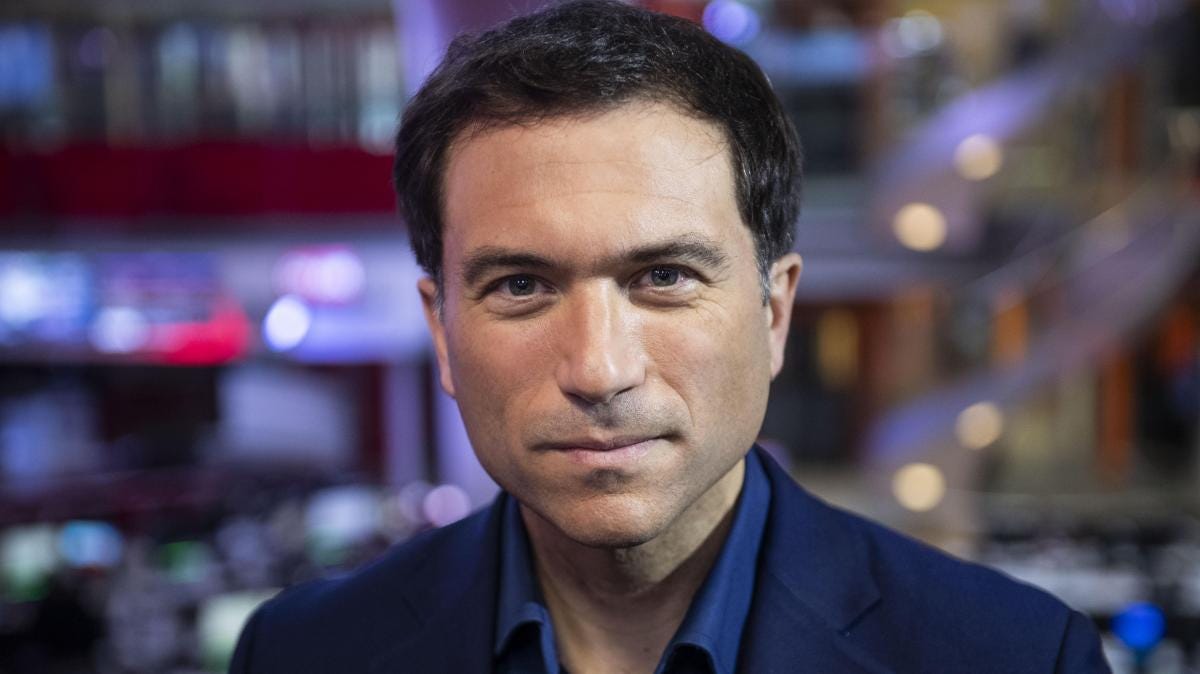How long is a piece of content?
The new star of BBC news, what he has in common with Peter Jackson, and what stories do to time.
Ros Atkins, by Lucy Young, Sunday Times.
A midweek Ruffian! Well, I guessed people might be busy on Saturday so…
BBC News has a new star. Over the last year or so, a journalist called Ros Atkins has been making viral videos with an R that is off the charts. The Atkins videos are not polemics or rants. They don’t set out to enrage or amuse. They do not, in short, take any of the most-travelled paths towards social media virality. They are fact-based explainers. Explainers! That unsexy genre is suddenly the hottest news in news.
Atkins and his team are brilliant at taking complex subjects - like the economics of supply chains, or the German election, or China-Taiwan tensions, or Formula 1 - and making them comprehensible to viewers with little to no prior knowledge. Not just comprehensible, but highly compelling. Each package is a mini-masterpiece of editing, pitched and paced with enormous skill. I never feel like I’m being spoken to like a dim child, or that I can’t keep up, or that I want to click on something else. Nor do I feel I can afford to look away: the videos demand an effort of concentration that I’m happy to give.
The success of Atkins puts a dent in certain theories, like the one that says journalistic impartiality is passé. The very idea of objectivity is considered unforgivably naive by some, who argue that since every journalist has an angle and and an agenda, it’s best to be honest about where you’re coming from and commit to it. Since the BBC’s raison d’etre depends on the tattered flag of impartiality, BBC journalists often find themselves under attack from all sides, for being unwilling to commit to any of them. Yet, unusually for a BBC journalist, Atkins has won praise from culture warriors on the left and right, despite covering controversial, political topics.
I suspect that one reason some journalists have become sceptical of objectivity or impartiality is that they worry, in their bones, that it’s boring. In the age of social media, there is no greater crime than not being able to win and hold attention. What is most likely to do that? Pungently expressed opinion: polemic, invective, outrage. Rachel Maddow, Tucker Carlson and endless YouTubers get millions of views for their opinion monologues. If you work for the BBC it must sometimes feel unfair that the cool kids get to have all the fun while you’re expected to sound blandly judicious. Perhaps that’s why Emily Maitlis tried to emulate the Maddow style on Newsnight, an act for which she was reprimanded by the BBC.
The Atkins videos take the form of an opinion monologue but the content is dense with facts and evidence. He demonstrates that impartiality can be gripping, that it can fizz and coruscate, that it doesn’t have to mean a bland and toothless on the one hand this, on the other. Dishonesty and corruption can still be ruthlessly exposed. Atkins’s account of the No.10 Christmas Party has sharp teeth indeed, and to me is more devastating than any opinion monologue would have been. His style has been described as “assertively impartial” and that sounds about right.1
One of the most striking things about the Atkins videos is how long they are: five to ten minutes. Mega-viral news videos are not supposed to be that length. Here is what Atkins said when the CNN journalist Tara Mulholland remarked on this:

If you’re a news organisation or any entity that has to communicate complex information to the public, it’s good to fret about being boring, but worry too much about it and you can miss the point altogether. A common mistake is to fixate on one variable in particular: length. This [podcast/ad/newsletter/etc] has to be under X minutes/words or nobody will watch/read/listen to it! This is not mad - there really are lots of distractions available to people at all moments - but it can result in content whose sole virtue is brevity. For instance, I recently wanted to learn about how Covid variants originate and came across this explainer. It is frustratingly light on information and consists mainly of generalities recited over annoying music - but hey at least it’s only a minute long, right?
The obsession with a simple rule like short time lengths can blind people in the media to opportunities for innovation. Atkins was confident enough to ignore the orthodoxy. He realised that if viewers are fed enough crunchy factual goodness, at the right pace and in the right proportions, they stop checking the clock.
I think this tells us something important about the nature of attention, and indeed - bear with me, Ruffians - the nature of time itself….
In Part II, beyond the paywall: the truth about attention spans, and what stories do to time (with a detour via Get Back). Plus my overview of the Covid situation, and a winter wonderland of juicy links.
Keep reading with a 7-day free trial
Subscribe to The Ruffian to keep reading this post and get 7 days of free access to the full post archives.





